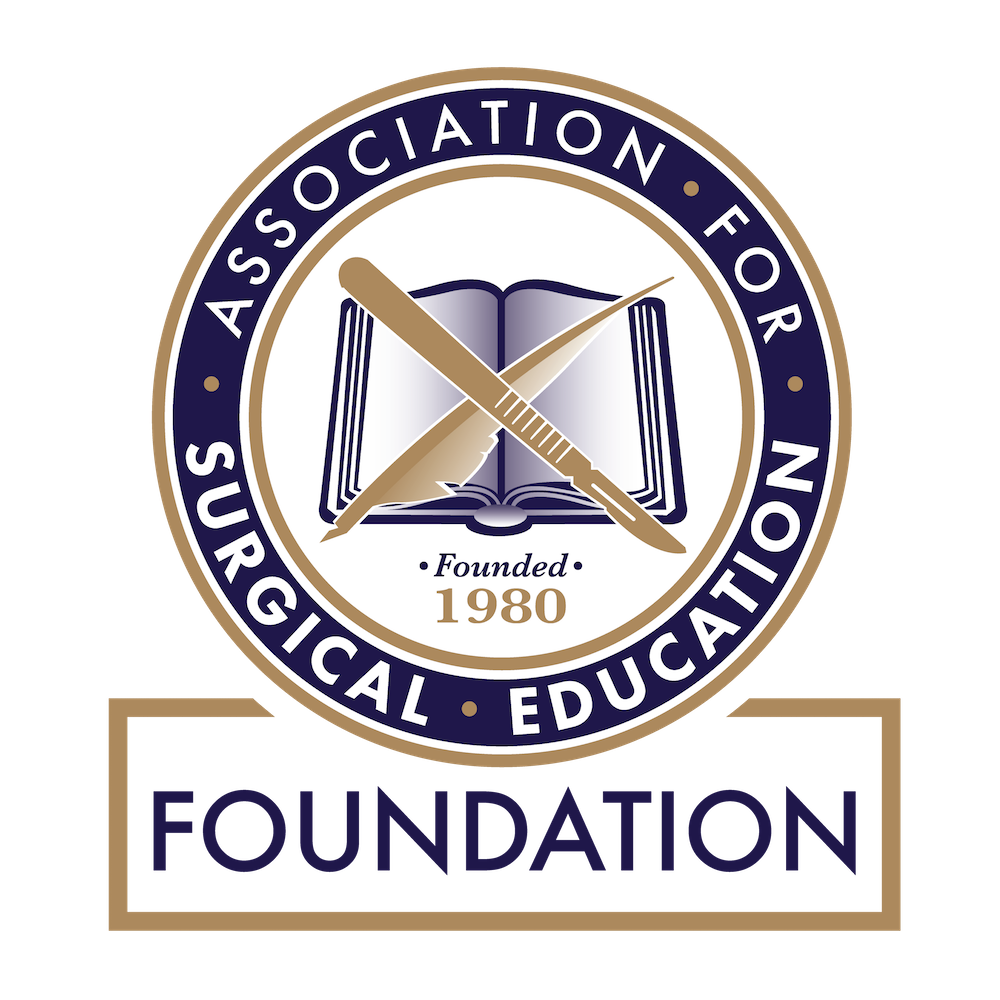CESERT Pyramid Grant Awardees!
The Association for Surgical Education Foundation was established by the Association for Surgical Education (ASE) as a non-profit foundation in 1993. Its mission is to raise and disseminate funds to support innovative research and education projects and programs which will advance surgical education in North America. The Association and the ASE Foundation are separately-incorporated organizations.
Questions? Please contact our Executive Director and Grant Administrator, Christelle Menetrier @ christelle@surgicaleducation.com.
2025 ASE FOUNDATION CESERT PYRAMID GRANT AWARDS
The Association for Surgical Education Foundation (ASEF) is excited to announce the awardees of surgical education research grants to start July 1, 2025.
Giant Robot ($25,000) Sponsored by Intuitive
The Impact of Gesture Based Feedback on Trainee Intestinal Robotic Anastomosis Skills
Diana Garces Palacios, MD (PI), UT Southwestern
Ganesh Sankaranarayanan, MD (C0-PI), UT Southwestern
Determining the Effectiveness of Tailoring Robotic Surgery Skills Training to Learner Cognitive Load on Skill Acquisition: A Randomized Control Trial
Noosha Deravi, MD, (PI), Indiana University
Dimitrios Stefanidis, MD, (Co-Pi), Indiana University
Platinum ($10,000)
Quality and Equitability of Surgical Subinternships
Jonah Thomas, MD, MS (PI), Mass General/ Harvard
Diamond ($2,500)
Transforming operative notes into large-volume assessment tools using natural language processing
Ruchi Thanawala, MD, MS, (PI), Oregon Health & Science University
Phillip Jenkins MD, (PI), Oregon Health & Science University
Julie Doberne, PhD, (Co-PI), Oregon Health & Science University
Steven Bedrick, PhD, (Co-PI), Oregon Health & Science University
Decoding the Impact of Preference Signals on General Surgery Residency Selection: A Mixed Methods Analysis of Program Directors, Applicants, and Medical Student Advisors
Sarah Lund, MD (PI), Mayo Clinic
Trenton Foster, MD (Co-PI), Mayo Clinic
Gold ($500)
Creation of an Artificial Intelligence Tutor for Promoting Surgical Educator Use of Growth Mindset Language
Rebecca Hoffman, MD (PI), Geisinger Medical Center
Michael Furey, DO (Co-PI), Geisinger Medical Center
Educational scholarship as a pathway for promotion in academic surgery: An assessment 20 years later
Jennifer Yu MD, MPHS, (PI), Washington University School of Medicine in St. Louis
Nicole Santucci, MD, MA, (Co-PI), Paul E. Wise, MD, (Co-PI), Washington University School of Medicine in St. Louis
Defining Operative Autonomy: Perspectives from Surgical Residents and Faculty
Nina Zhao MD, MAEd, (PI), University Hospitals Cleveland Medical Center/Case Western Reserve University
Hayley Baker, MD, (Co-PI), University Hospitals Cleveland Medical Center
Examining national trends of surgery resident participation in patient safety and quality improvement
Jasmine Estrada MD, (PI), University of Iowa
Hassan Aziz, MD, (Co-PI), University of Iowa
Comprehensive Evaluation of the Vascular Surgery Leadership Development Program
Tiffany Bellomo MD, (PI), Mass General/Harvard Medical School
Babak Abai, MD (Co-PI), Roy Phitayakorn, MD, (Co-PI), Mass General/ Harvard Medical School
Development of Robotic Surgery Curriculum for Cardiothoracic Surgery Training
Chase Marso, (PI), Mass General/Harvard Medical School
Roy Phitayakorn, MD, (Co-PI), Mass General/ Harvard Medical School
Behind a Mask of Shame: A Hermeneutic Phenomenologic Exploration of Surgical Residents’ Experiences with Shame
Steven Thornton MD, (PI), Duke University
Jacob A. Greenberg, MD, (Co-PI), William Bynum, MD, (Co-PI), Duke University
Simulation-based Verbal De-escalation Training for Surgery Residents: A Needs Assessment
Melissa Brunsvold MD, FACS, FCCM, (PI), University of Minnesota
Lauren Weaver, MD, (Co-PI), University of Minnesota
From the Perspective of Graduates: Exploring Participation and Impact of the ACS-AEI Accredited Fellowship Program
Michael Healy EdD, (PI), Mass General/Harvard
Dandan Chen, PhD, (Co-PI), Mass General/Harvard
Thank you to Intuitive for sponsoring the Giant Robot Grants,
and to Surgical Science Simbionix Simulators for sponsoring a Diamond Grant!
The Gold, Diamond, Platinum and Giant Robotic grants are described below:
Gold-level grants range from $500-$1000 USD each and ideally suited to fund small surgery education projects such as survey research projects. The timeline for these projects should be within one academic year.
Diamond-level grants are well-suited for mixed methods surgery education projects. The timeline for these projects should be within one to two academic years.
The Platinum level grant is designed to support multi-institutional research projects. The timeline for these projects should be two academic years.
The Giant Robot grant will be funded as two grants of $25,000 USD for 2022. It is designed to support research projects that focus on robotic surgery research questions including curriculum design, training programs, assessment metrics, and patient outcomes. The timeline for these projects should be two academic years. The $25,000 grant will be distributed in two payments (July 2024, and January 2025).
For all grants funds must be used for direct costs or to support a research assistant, statistician, or other study staff. Funds cannot be used for indirect costs, administrative or travel costs, publication costs, or salary support for the Principal Investigator, Co-PIs, or collaborators.
Questions? Please contact our Executive Director and Grants Administrator, Christelle Menetrier @ christelle@surgicaleducatio.com.


